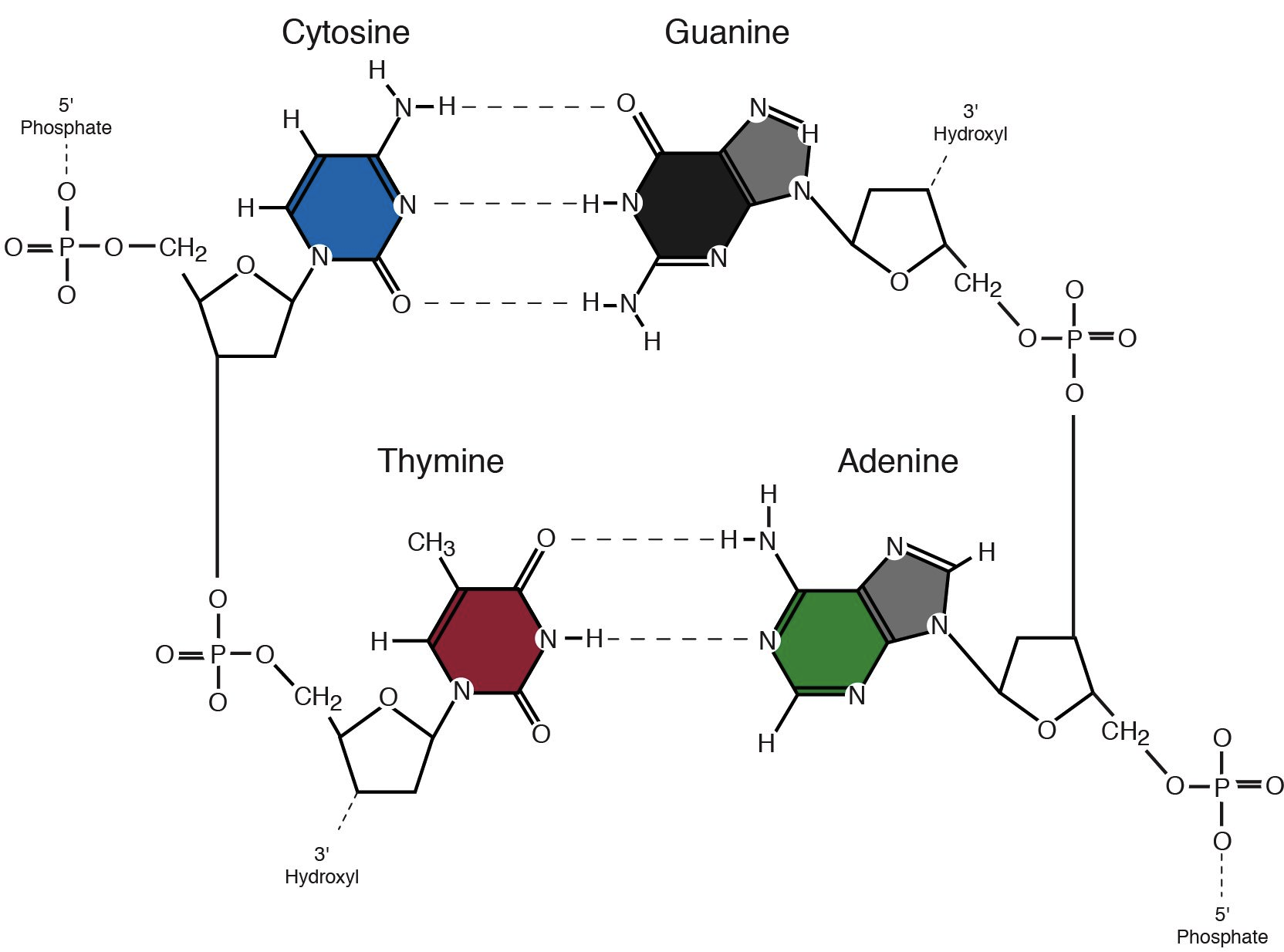Three differences between DNA and RNA
Nitrogen Bases (Thymine vs Uracil)
Pentose Sugar (Deoxyribose vs Ribose)
DNA is usually double stranded while RNA is usually single stranded
Three structures common to cells in all living organisms
DNA
Cytoplasm
Plasma Membrane
The binomial naming system includes these identifying taxa
Genus species
The definition of Evolution
Change in heritable characteristics of a population over time
5 Kilometers is this many miles
3.1 miles
The type of bond between Cytosine and Thymine

Covalent Bond
I can predict a newly discovered living organism will consist of 1 or more cells due to this
Cell Theory states that all living things are made up of cells
This is the difference between the Morphological and Biological Species Concepts
Morphological based on similar traits and/ or characteristics; Biological groups species on ability to successfully interbreed
The difference between homologous and analogous structures in the study of Evolution
Homologous structures, such as pentadactyl limbs (5 "fingered" limbs) show commonalities between related species through traits inherited from a common ancestor. Homologous structures show divergent evolution.
Analogous structures are similar structures in organisms that evolved them separately and show convergent evolution
The most expensive type of food in the world
A certain Caviar: $34,500 Per Kilogram
One kilogram of this particular type of caviar will cost you the same price as some brand new cars.
The cost is down to the limited number of eggs that the albino sturgeon produce, as they usually only deliver eggs once every 100 years!
Provides evidence of universal common ancestry
Conservation of genetic code across all form of life - Every organism has DNA; DNA that codes the same in all organisms, for the same proteins. Certain base code sequences are present in almost all organisms.
The specific name and function of the structure labeled "B"

70s Ribosome. Makes proteins.
The reason it can be difficult to distinguish whether 2 organisms are separate species or just varied versions of the same species
Speciation happens very gradually in most cases, so it is difficult to say when they stop being the same species and when they are "officially" a new species
Name a type of reproductive isolation and how it would affect a population
several answers: geographical, temporal, behavioral ...
Artist with the most monthly listeners on Spotify as of Dec 2024
Bruno Mars
This makes water a good solvent. ALSO, explain why this is important for living things
Water is a good solvent because it is polar. This makes it able to dissolve, carry, and make use of many molecules and enzymes necessary for life.
Name structure "A". Justify your answer (why do you think it is that organelle), and give its function.

Mitochondria - Size (smaller than nucleus), shaped kind like a bean or oval, and many folds inside. Creates ATP for cell energy
These characteristics of the structures pictured in a karyotype or karyogram allow us to group, classify, and look for differences or similarities.
Chromosome banding patterns, length of chromosome, centromere position.
Southeast Asian forests dominated by the tree family Dipterocarpaceae are threatened by deforestation and climate change. This is the cause of their decline, including a specific vocabulary term referring to the culprit of the damage.
Direct (deforestation) and Indirect (Climate change) anthropogenic loss of biodiversity
Highest Grossing Movie of 2024
1. Inside Out 2
2. Deadpool
3. Despicable Me 4
The heat capacity of water compared to air, and an adaptation or behavior aquatic living things use to cope with the difference.
The heat capacity of water is higher, meaning it takes more energy to heat it. This means organisms that live in water won't lose heat quickly.
Electron microscopes have higher magnification and resolution than light microscopes. This is (at least) one advantage of light microscopes.
Current and/ or potential future use of whole genome sequencing
current: researching evolutionary relationships
future: personalized medicine
One example and one benefit each of in situ and ex situ conservation
in situ conservation of species in natural habitats, management of nature reserves, rewilding, reclamation of degraded ecosystems - don't have to move species, less expensive
ex situ conservation in zoos and botanic gardens and storage of germ plasm in seed or tissue banks - more controlled, easier to oversee in lab, etc., less variability than nature
two months of the year are named for mortal men
July & August